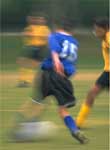 | College Athletes are Unaware of Head Injury Symptoms |
 | College Athletes are Unaware of Head Injury Symptoms |
|
August 12, 2003
A concussion is defined by the American
Academy of Neurology as a "trauma-induced alteration in mental status
that may or may not involve loss of consciousness." So, a person does not
need to become unconscious to have suffered a concussion. Rather, any
change in mental status such as memory loss or confusion are signs of a
Dr. Kaut and his colleagues studied the number of head injuries in 461 male and female athletes and asked these students what they knew about the symptoms of head injuries. Almost one-third (31.9%) of the athletes reported that they had experienced a direct blow to the head that caused dizziness. A total of 34 of 95 (35.8%) football players, 7 of 45 (15.6%) male soccer players and 14 of 72 (19.4%) female athletes (basketball, diving, softball, volleyball players) reported they had dizziness after being struck in the head. Other symptoms of head injury experienced by the athletes after being hit in the head included:
 Many athletes in the survey reported that they continued to play in practice or games with headaches (30.4%) and dizziness (28.2%) after being struck in the head. More than half of the football players (61.2%) continued to play with headaches. Some football players (25.2%) who continued to practice or play did not tell their coaches or trainers that they were dizzy. The male soccer players and female athletes, however, thought it was a good idea to tell their coaches that they felt dizzy: only 4.4% of the soccer players and 9.7% of the women athletes did not inform their coaches or trainers about their dizziness. When asked, "Do you understand the problems that can occur as a result of a head injury?", only 43.7% of the athletes answered, "Yes." The most common symptoms of head injury mentioned by students who knew about such problems were:
 Few students mentioned attention/concentration problems (3.6%), thought disturbances (2.7%), loss of consciousness (2.7%), vomiting (2.7%) or hearing problems (1.8%). Many studies indicate that athletes from many different sports are at risk for head injuries. Additionally, the more times a person gets a head injury, the more they are at risk for a severe concussion. Therefore, it is important for athletes to be in good shape, know the rules of the game, and take the necessary safety precautions. It is also important for athletes to know the symptoms of a head injury so they can alert their coaches and trainers. Athletes who work with their coaches, trainers and doctors can help minimize the chance of a more serious injury. |
|
References and further information:
|
| GO TO: | Neuroscience In The News | Explore the Nervous System | Table of Contents |
![[email]](./gif/menue.gif) Send E-mail |
 Fill out survey |
 Get Newsletter |
 Search Pages |